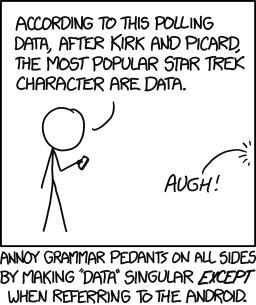Um, there's timing information in Switchboard?
We start with a psycholinguistic controversy. On one side, there's Herbert Clark and Jean Fox Tree, "Using uh and um in spontaneous speaking", Cognition 2002.
The proposal examined here is that speakers use uh and um to announce that they are initiating what they expect to be a minor (uh), or major (um), delay in speaking. Speakers can use these announcements in turn to implicate, for example, that they are searching for a word, are deciding what to say next, want to keep the floor, or want to cede the floor. Evidence for the proposal comes from several large corpora of spontaneous speech. The evidence shows that speakers monitor their speech plans for upcoming delays worthy of comment. When they discover such a delay, they formulate where and how to suspend speaking, which item to produce (uh or um), whether to attach it as a clitic onto the previous word (as in “and-uh”), and whether to prolong it. The argument is that uh and um are conventional English words, and speakers plan for, formulate, and produce them just as they would any word.
And on the other side, there's Daniel C. O'Connell and Sabine Kowal, "Uh and Um Revisited: Are They Interjections for Signaling Delay?", Journal of Psycholinguistic Research 2005:
Clark and Fox Tree (2002) have presented empirical evidence, based primarily on the London–Lund corpus (LL; Svartvik & Quirk, 1980), that the fillers uh and um are conventional English words that signal a speaker’s intention to initiate a minor and a major delay, respectively. We present here empirical analyses of uh and um and of silent pauses (delays) immediately following them in six media interviews of Hillary Clinton. Our evidence indicates that uh and um cannot serve as signals of upcoming delay, let alone signal it differentially: In most cases, both uh and um were not followed by a silent pause, that is, there was no delay at all; the silent pauses that did occur after um were too short to be counted as major delays; finally, the distributions of durations of silent pauses after uh and um were almost entirely overlapping and could therefore not have served as reliable predictors for a listener. The discrepancies between Clark and Fox Tree’s findings and ours are largely a consequence of the fact that their LL analyses reflect the perceptions of professional coders, whereas our data were analyzed by means of acoustic measurements with the PRAAT software (www.praat.org). […] Clark and Fox Tree’s analyses were embedded within a theory of ideal delivery that we find inappropriate for the explication of these phenomena.
Read the rest of this entry »


